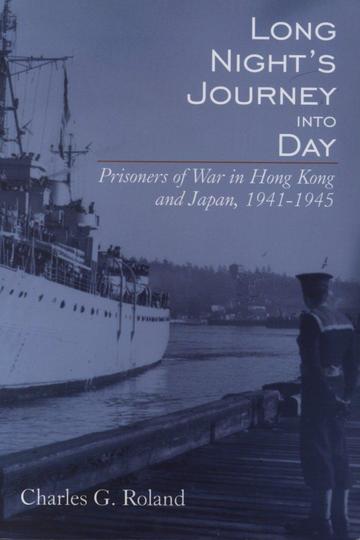Sickness, starvation, brutality, and forced labour plagued the existence of tens of thousands of Allied POWs in World War II. More than a quarter of these POWs died in captivity.
Long Night’s Journey into Day centres on the lives of Canadian, British, Indian, and Hong Kong POWs captured at Hong Kong in December 1941 and incarcerated in camps in Hong Kong and the Japanese Home Islands. Experiences of American POWs in the Philippines, and British and Australians POWs in Singapore, are interwoven throughout the book.
Starvation and diseases such as diphtheria, beriberi, dysentery, and tuberculosis afflicted all these unfortunate men, affecting their lives not only in the camps during the war but after they returned home. Yet despite the dispiriting circumstances of their captivity, these men found ways to improve their existence, keeping up their morale with such events as musical concerts and entertainments created entirely within the various camps.
Based largely on hundreds of interviews with former POWs, as well as material culled from archives around the world, Professor Roland details the extremes the prisoners endured — from having to eat fattened maggots in order to live to choosing starvation by trading away their skimpy rations for cigarettes.
No previous book has shown the essential relationship between almost universal ill health and POW life and death, or provides such a complete and unbiased account of POW life in the Far East in the 1940s.
Charles G. Roland practised general medicine, was senior editor of the Journal of the American Medical Association, and served as chair of the Department of Biomedical Communication at the Mayo Clinic and Mayo Medical School in Rochester, Minnesota. He was Hannah Professor Emeritus of the History of Medicine at McMaster University and author of Courage under Siege: Disease, Starvation, and Death in the Warsaw Ghetto.
Roland draws upon hundreds of interviews with former POWs, as well as archival material from around the world to detail and document the extreme conditions that the prisoners were compelled by their captors to endure. Long Night's Journey into Day is an essential, core title for any serious World War II studies reference collection.
This is a story of disease and starvation, and its direct impact on POW survival rates. It is a gruesome story, punctuated with moments of comedy and pathos. Above all, it is a story of unstinting dedication by the medial officers and the hospital orderlies who performed heroic tasks in such demanding environments. The array of primary sources fomr Australia, Canada, Great Britain, Hong Kong, and the United States is indeed impressive. Of particular note, is the vast amount of hitherto unknown or unused clinical analyses produced in the immediate postwar period, which provide invaluable insights into the medical side of POW lfe. Another useful source that Roland should be congratulated on are the scores of interviews he has conducted with ex-POWs and civilian internees over the past twenty-five years. For these accounts provide a raw edge to a growing litany of horrifying POW experiences.
''Roland draws upon hundreds of interviews with former POWs, as well as archival material from around the world to detail and document the extreme conditions that the prisoners were compelled by their captors to endure. Long Night's Journey into Day is an essential, core title for any serious World War II studies reference collection.''
This is a meticulously researched book using interviews, archives, libraries and other writings. The mammoth task of collecting this scattered material and sifting it was conducted over twenty years....Roland's simple story of the common man, coping with adversity, shows that humanity at its best will always overcome its common frailties.
A welcome and excellent addition to the small literay resource available....Considering the extraordinarily difficult circumstances in which these [prisoners] lived, these records are a tribute to their fortitude and determination.



